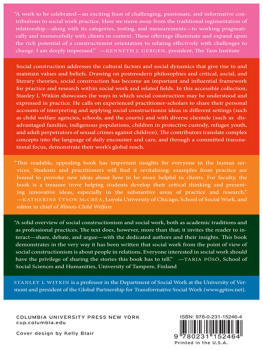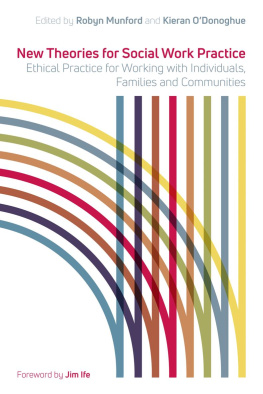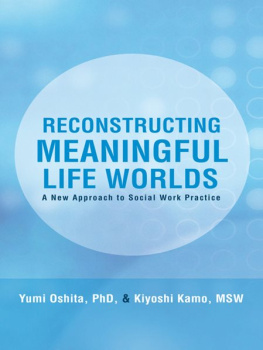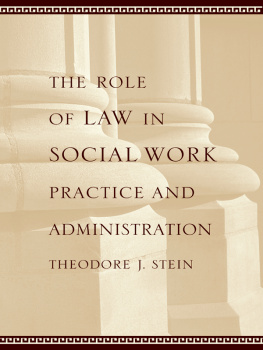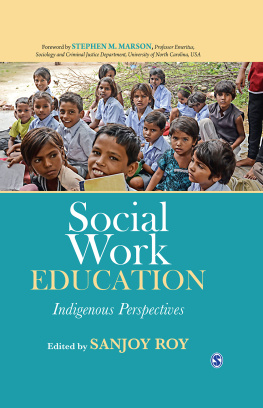Social Construction and Social Work Practice
Social Construction and Social Work Practice
Interpretations and Innovations
EDITED BY
STANLEY L WITKIN
Columbia University Press New York
Columbia University Press
Publishers Since 1893
New York Chichester, West Sussex
cup.columbia.edu
Copyright 2012 Columbia University Press
All rights reserved
E-ISBN 978-0-231-53030-9
Library of Congress Cataloging-in-Publication Data
Social construction and social work practice : interpretations and innovations / [edited by] Stanley L Witkin.
p. cm.
Includes bibliographical references and index.
ISBN 978-0-231-15246-4 (cloth : alk. paper)ISBN 978-0-231-53030-9 (ebook)
1. Social constructionism. 2. Social service. I. Witkin, Stanley L, 1947II. Title.
HM1093.S63 2011
361.201dc22 2011012093
A Columbia University Press E-book.
CUP would be pleased to hear about your reading experience with this e-book at cup-ebook@columbia.edu.
References to Internet Web sites (URLs) were accurate at the time of writing. Neither the author nor Columbia University Press is responsible for URLs that may have expired or changed since the manuscript was prepared.
Contents
Dennis Saleebey
Stanley L. Witkin
Stanley L. Witkin
Shifting from Assessment to Collaborative Exploration
J. Christopher Hall
From Freudian Beginnings to Narrative Ends
Ruth G. Dean
Reflexivity and Practice
Fiona Gardner
Nigel Parton
Deborah R. Major
The Value of Social Constructionism
Trish Walsh
Dan Wulff and Sally St. George
Trauma and Violence Work with Men Who Have Sexually Abused Minors
Marie Keenan
Wai-fong Ting
Engaging the Discursive Practices of the Nation-State
Martha Kuwee Kumsa
Stanley Witkin, whose career path has led him from the ideological and methodological inclinations of positivism and modernism to the penchants of social constructionism, has put together a book that begins with that journey but quickly branches out into a rich and compelling accounting of what social constructionism means for social work theory, practice, and pedagogy. A central constructionist notion is that words, images, and ideas constitute the world for us; words do not reflect what is real, as modernists and positivists would have it. In that spirit, Witkin makes it clear at the outset that disparate theoretical and ideological allegiances and preferences will value different kinds of information, concepts, and ideologies and will, therefore, lead to different kinds of talk and practices. In the case of social constructionism, however, what practitioners do in their routines, how they relate to clients, and the tools they use are always emerging from the dialogues, the conversations, and the interactions with individual clients and colleagues. That assumption, he says, gives us greater freedom to respond to the nuances and particularities of the situation (see ).
Importantly, and clearly within the purview of a social constructionist ethos, Witkin writes in a style that is accessible and conversational. The late pedagogue of freedom, Paulo Friere, wrote of the contrast between banking education whereby the oppressor, however well-intentioned, stifles true engagement and conceals the students power and wisdom from them through the use of foreign or strange concepts and theories. Liberating education, on the other hand, regards dialogue as indispensable to the act of cognition which unveils reality (Friere, 2001, p. 83). It is in this spirit that Witkin has compiled this book. He has brought together contributors to this volume who know the importance of discourse and dialogue, and it is reflected in their writing, their teaching, their practice, and their understanding of social work.
Over the years, Jerome Bruner (1990) has written of the critical distinction, both in professional discourse and in ordinary conversation, between the paradigmatic and the narrative, or, more simply, between theory and story. We know a lot about the paradigmatic; it reigns supreme in our education, and professions, including social work, aspire to it. In its most developed form, it is a logical, scientific, formal, even mathematical system of explanation. But books like this one bring to social work a much needed corrective to the paradigmatic ambition, and help put practice, research, and teaching in social work back in the niche where it can acknowledge, appreciate, affirm, and, most importantly, act in the daily world of clients. The significance of this book to the social work profession cannot be overstated. Students, teachers, and researchers will find here an abundance of ideas and practices to leaven the work that they do on behalf of clients and in the service of social justice.
Dennis Saleebey
Professor Emeritus
School of Social Welfare, University of Kansas
References
Bruner, J. (1990). Actual minds, possible worlds. Cambridge, MA: Harvard University Press.
Freire, P. (2001). Pedagogy of the oppressed, 30th anniversary ed. New York: Continuum.
I have been fortunate during my career to know many bright, interesting people. Building relationships and engaging in conversations with these folks has enriched my personal and professional life and has been a continual source of ideas and inspiration. About 10 years ago, one of those people (Dennis Saleebey) and I decided to make sure that we (and others) would have the opportunity to continue these conversations on a regular basis. We instituted a small, annual gathering in Vermont where participants could take part in two and a half days of dialogue about social construction and other postmodern perspectives (see Witkin and Saleebey, 2007, for additional information). As we hoped, these gatherings have generated many stimulating conversations and connections with interesting people from all over the world. Some of them constitute the contributors to this book: social work scholars-practitioners for whom social constructionist ideas have informed and enhanced their practice.
Anyone who has published an edited book knows that it is a collaborative enterprise. The current text is no exception. Coordinating the efforts of 11 talented authors from six countries requires mutual patience, flexibility, and conscientiousness. I was fortunate in working with a group who exemplified these qualities. Therefore, my first acknowledgement and note of thanks goes to them. Their ability to translate social constructionist ideas into creative practices and to express those translations in ways that are accessible to readers gives this book its potential to contribute to the corpus of knowledge about social work practice.
In addition to the chapter authors, there are many others, past and present, whose intellectual curiosity, perspicacity, wisdom, friendship, enthusiasm, and support have contributed to my ability to conceptualize and carry out this project. Without diminishing the contributions of those not mentioned, I want to particularly acknowledge Dennis Saleebey, Roberta Iversen, Mirja Satka, Mary Katherine OConnor, Jan Fook, Katherine Tyson-McCrae, Ann Weick, Adrienne Chambon, and Allan Irving. Their friendships and ongoing dialogues have been an invaluable resource and wellspring of ideas. Brenda Solomon, Susan Roche, and Susan Comerford, colleagues in the social work program at the University of Vermont, have been collaborators in the development and delivery of a social constructionistoriented curriculum and steadfast supporters of this work. The many students who have taken my classes (voluntarily and not) over the years made the need for such a book visible to me. The many colleagues and friends from the Global Partnership for Transformative Social Work, the umbrella organization for the previously mentioned gathering, have been an enduring source of intellectual enrichment and an antidote to the sometimes numbing effects of an overly corporatized academic life.

